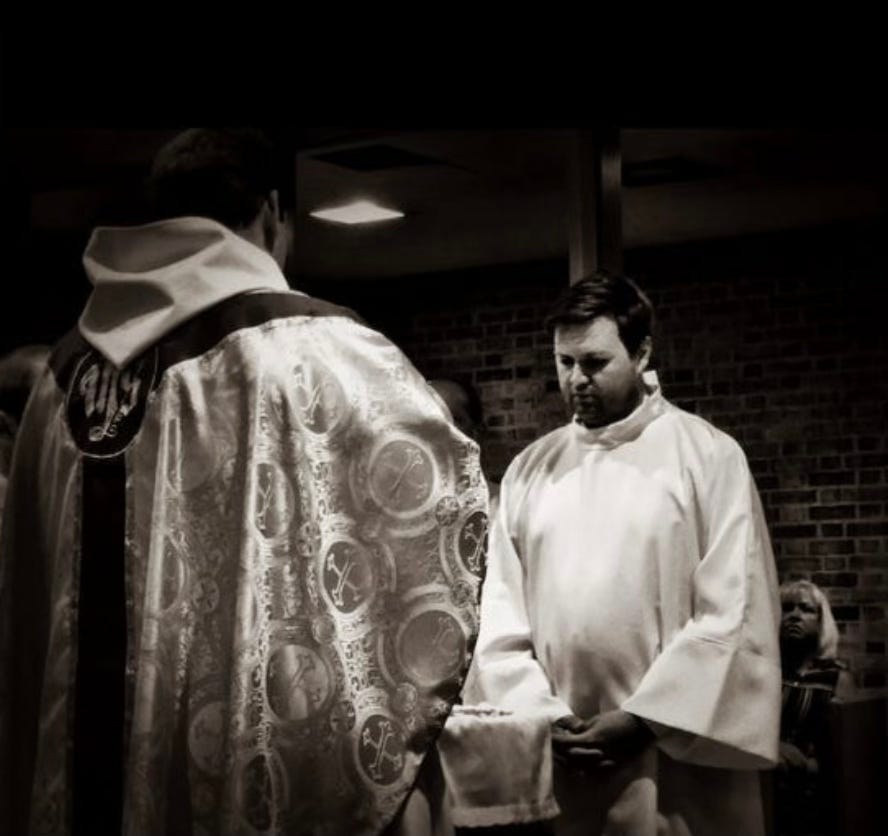Part 2: The Shadow of Christian Nationalism: J.D. Vance, the Vice Presidency, and the Threat to Pluralism
Part 1: The Dark Enlightenment Lens: Understanding the Slow Strangulation of Democracy
Part 3: Silicon Valley's Unholy Alliance: How Tech Wealth Powers the New Religious Right
Part 4: From Heidegger to Here: The Philosophical Roots of America's Alt Right
Part 5: Accelerating Toward Autocracy: Nick Land's Vision and Its Implementation
American pluralism - the principle that a diverse society, encompassing people of different beliefs, cultures, origins, and lifestyles, can coexist and participate freely - has long been a cornerstone of its democratic experiment, albeit one tested by enduring tensions between religious faith and secular (non-religious) governance. The Constitution’s framers, navigating the legacy of the Enlightenment and rejecting rule by religious authorities (theocracy), enshrined religious liberty while guarding against any single creed dominating the state.
This fragile balance now faces a direct assault from within, driven by Christian Nationalism: an ideology striving to forcibly fuse American identity with a specific, often exclusionary interpretation of Christianity. More than personal faith, this is a political project declaring the United States a ‘Christian nation’ by right, demanding its laws and future submit to this singular vision. At the forefront of this movement's capture of political power stands J.D. Vance, currently serving as Vice President after a rapid ascent from Ohio Senator. Vance’s rise, significantly propelled by a network of intellectuals sometimes dubbed the ‘TheoBros,’ starkly illuminates this danger, merging theological arguments with executive power in ways both politically potent and deeply perilous for the nation's diverse character.
This article dissects the mechanics of Christian Nationalism as embodied by Vice President J.D. Vance, scrutinizing its intellectual arsenal and the specific tactics by which it threatens the foundations of secular governance and diverse society, offering a critical case study in the contemporary erosion of democratic norms. This alarming trend in the US mirrors global patterns where religious and ethno-nationalist movements in countries like India, Brazil, Russia, and parts of Europe similarly attack secular governance and pluralistic norms.
Defining Christian Nationalism: The Bible and the Flag
Christian nationalism operates as a potent political ideology engineered to reinterpret and ultimately capture America's identity through a specific theological lens. As scholars Andrew Whitehead and Samuel Perry detail (2020), its core conviction demands that the nation’s culture, laws, and public identity be coerced into reflecting conservative Christian values. This project relies heavily on fabricating a selective history that emphasizes a divine Christian founding, exalting the Puritans' "city on a hill" while actively suppressing the scepticism of figures like Jefferson or the pluralism of others like Franklin. Historian John Fea (2016) meticulously dismantles this revisionist myth, revealing a Constitution explicitly designed to protect diverse faiths, not establish one. This nationalist worldview functions by designating ‘true’ Americans - typically white, conservative Christians - while systematically marginalising others as outsiders, deepening societal fractures (Gorski, 2017).
Critically, it demands the infusion of government with specific Christian doctrines, thereby intentionally eroding the foundational separation of church and state - a principle enshrined in the First Amendment's Establishment Clause, which forbids government endorsement of religion - a danger laid bare by Katherine Stewart (2020). Fuelled by anxieties about secularisation, the current iteration burns with urgency, amplified by influential ideologues forging its intellectual weaponry. Understanding these core tenets is crucial, as they function not merely as abstract beliefs but as potent political weapons for mobilizing a specific electoral base, delegitimizing political and cultural opponents, and justifying policy explicitly aimed at reshaping the nation according to a singular religious-national vision.
J.D. Vance: From Chronicler to Vice President, A Conduit for Postliberal Doctrine
Vice President J.D. Vance’s political metamorphosis offers a stark case study. His 2016 memoir, Hillbilly Elegy, captured widespread attention by articulating the perceived grievances of the white working class. His subsequent path, however, reveals a sharp ideological capture. A 2019 conversion to Catholicism coincided with his embrace of ‘postliberalism,’ an ideology fundamentally hostile to core tenets of modern liberal democracy, including individual autonomy, secularism (the principle of separating government from religious control), and pluralism itself, seeking instead to impose a society ordered around a predefined “common good,” dictated by explicitly Christian precepts.
This ideological alignment connects him directly to influential figures within the network informally labeled the ‘TheoBros,’ predominantly young, male intellectuals fusing theology and traditionalism to engineer a faith-dominated public square. While the label is informal, it identifies a coherent intellectual current demonstrably influencing Vance. Key figures propagating these doctrines include:
Adrian Vermeule: The Harvard law professor spearheads "common-good constitutionalism," an explicit rejection of originalism and liberal legalism (Vermeule, 2020). His framework demands a state actively enforcing substantive moral ends derived largely from Catholic social teaching, where law serves "our substantive flourishing," a collective well-being defined by traditional morality that proponents argue should take precedence over conflicting individual rights claims. This necessitates abandoning legal neutrality on moral questions, empowering the government to coerce citizens towards state-defined virtue. His ideas underpin Vance's expressed scepticism towards liberal norms and his admiration (Vance, 2021) for autocratic leaders like Hungary’s Viktor Orbán, who aggressively implements a state-enforced "Christian democracy." As Vice President, echoes of Vermeule's doctrine are detectable in administration signals about leveraging federal power to enforce "family stability," potentially through policies privileging traditional religious structures.
Sohrab Ahmari: A polemicist and co-founder of Compact magazine, Ahmari champions a belligerent, ‘muscular’ Christian politics. His work (e.g., The Unbroken Thread, 2021) aggressively attacks liberalism's legacy. His framing of issues like immigration restriction as a "moral duty" (Edsall, 2022) provides Vance with rhetoric casting cultural shifts as symptoms of moral rot demanding state correction.
Patrick Deneen: In his influential Why Liberalism Failed (2018), this political theorist argues liberalism's individualism inevitably breeds decadence and decay. This diagnosis provides Vance with a philosophical justification for rejecting democratic norms and admiring leaders who prioritize state-imposed cohesion over individual liberties. Deneen's postliberalism offers a blueprint for dismantling the liberal order.
Rod Dreher: Initially advocating strategic retreat (The Benedict Option, 2017), Dreher later became a vocal supporter of figures like Orbán, exemplifying a blend of cultural traditionalism with an embrace of authoritarian tactics to achieve social goals. This trajectory parallels Vance's political synthesis, evident in displays like the 2024 "Courage Tour" (Du Mez, 2024) which merged religious fervour with nationalist power projection.
Edmund Waldstein: Waldstein is a Cistercian monk who promotes ‘integralism,’ the doctrine demanding political authority's subordination to Catholic Church teaching, advocating ultimately for a confessional state where public life formally recognizes religious authority. While perhaps representing the ideology's more extreme edge, Waldstein's thought contributes to the intellectual climate pushing for a radical fusion of church and state power.
This network furnishes Vance with more than abstract ideas; it provides a strategic framework for translating abstract concepts like “common good” or “moral order,” terms often used here to signify a desired societal structure grounded in specific religious and traditional precepts, rather than individual autonomy. Potential policy directions are under threat of being impacted, such as areas from abortion access and LGBTQ+ rights to education curricula and border control. His Vice Presidency grants these doctrines alarming proximity to executive power, enabling potential influence over administrative action or the laying of groundwork for future political consolidation. The crucial backing of tech oligarchs like Peter Thiel provides not only vast financial resources but also lends a dangerous veneer of disruptive legitimacy to these anti-democratic ideologies, forging a potent alliance between tech capital and illiberalism. For a politician like Vance, embracing these postliberal and nationalist themes offers a powerful strategy for mobilizing a core base while attracting elite patronage within the contemporary conservative movement.
This intellectual alignment reveals disturbing overlaps with the Dark Enlightenment (NRx). As explored in detail in the companion piece on Plague Island, 'The Dark Enlightenment Lens: Understanding the Slow Strangulation of Democracy,' NRx constitutes an outright rejection of liberal democracy, promoting hierarchical alternatives, and attacking core institutions ('The Cathedral'). Despite NRx's often secular roots, its convergence with Christian Nationalism and postliberalism lies in their shared, vitriolic critique of egalitarianism (the principle of fundamental human equality) and democratic processes. Both currents express a deep scepticism towards liberalism's emphasis on individual autonomy and popular sovereignty, viewing it as leading to societal decay. This shared anti-democratic animus, whose specific tactics and endgame visions are further elaborated in dedicated analyses of NRx thought such as 'The Dark Enlightenment Lens,' is critically important, providing intellectual cover for authoritarian power grabs, the dismantling of checks and balances, and the imposition of a predetermined 'order,’ tactics central to the erosion of democratic governance observed globally. This synthesis of ideology and executive power signals a perilous potential shift, challenging the very foundations of American pluralism.
The Potential Dangers to American Democracy and Pluralism
The ascent of Christian nationalist ideas, weaponized through executive power, unleashes distinct and corrosive threats against America's democratic framework and its commitment to pluralism - the very idea of a diverse society functioning freely. Foremost among these is the direct assault on secular governance itself. When administrative directives or legislative campaigns aggressively impose specific Christian doctrines - governing reproductive rights, gender identity, education, or public life - they inherently violate state neutrality, alienate vast segments of the citizenry, and actively dismantle the nation's pluralistic compact (Whitehead and Perry, 2020). This imposition of a singular religious worldview is a hallmark tactic of regimes dismantling liberal democracy.
Compounding this is the focused assault on women's rights and autonomy often central to these ideologies. The drive for comprehensive abortion bans and restrictions on contraception constitutes a direct attack on bodily autonomy, justified through theological interpretations that explicitly negate individual freedom; this finds concrete expression in Project 2025 proposals aiming to leverage the full power of federal agencies like the Department of Health and Human Services (HHS) and the Justice Department to restrict access nationwide, potentially invoking antiquated laws like the Comstock Act to target abortion pills and related materials. Furthermore, the state promotion of traditional family structures and gender roles, rationalized via concepts like the "common good" (Vermeule, 2020) or critiques of liberal individualism (Deneen, 2018), threatens women's economic independence and equality, potentially rolling back decades of progress through policy and law. This control over women is not incidental but fundamental to the anti-pluralist project. Historically and globally, the subjugation of women represents a core strategy for authoritarian regimes imposing social control. While distinct from fictional dystopias, the trajectory resonates with potent cultural warnings, like those explored in Margaret Atwood's The Handmaid's Tale, about the dire consequences for women when theocratic impulses and patriarchal control achieve state power.
Furthermore, the ‘us vs. them’ narrative relentlessly propagated by nationalist rhetoric deliberately erodes social cohesion. By designating certain groups as illegitimate ‘others,’ it transforms political disagreement into existential warfare, shattering the possibility of compromise and shared governance (Gorski, 2017; Du Mez, 2024). As trust evaporates and society fragments along identity lines, the potential for political violence escalates, corroding the foundations of a functioning democracy. This divisive atmosphere is often coupled with overt authoritarian leanings. Fawning admiration for strongmen like Orbán, coupled with support for power-centralizing schemes like Project 2025 (Heritage Foundation, 2023), reveals a clear preference for autocratic efficiency over democratic accountability. This prioritization of ideological ends over democratic means, justified by anti-liberal philosophies, cultivates an environment hostile to dissent and ripe for the abuse of state power against perceived enemies, risking widespread social unrest (Stewart, 2020).
Integral to this strategy of consolidating power is the systematic hollowing out of independent institutions designed to check executive authority. The deliberate politicization of the civil service, purging experts in favour of loyalists, tactics explicitly planned within frameworks like Project 2025 - which outlines mechanisms such as the revival of 'Schedule F' classification to potentially remove tens of thousands of career federal employees deemed obstacles to the executive agenda and replace them with pre-vetted loyalists across government - directly align with strategies detailed within NRx frameworks aimed at dismantling the administrative state (state bureaucracy), concepts explored in 'The Dark Enlightenment Lens,' including 'RAGE' and the critique of the 'Cathedral'. Coordinated attacks on judicial independence - smearing judges, intimidation, circumventing rulings - constitute a fundamental assault on the rule of law aimed at insulating the executive from legal constraints. Similarly, the relentless delegitimization of the free press, hostility towards academic freedom, and efforts to corrupt electoral integrity are calculated tactics to neutralize opposition and seize control of the informational landscape. This institutional demolition is reinforced by historical revisionism; the campaign to falsely portray America's founding as exclusively Christian (Fea, 2016) serves to legitimize theocratic aspirations and marginalize dissenting traditions and communities. This playbook of weakening independent checks, controlling information, prioritizing loyalty, and rewriting history mirrors historical patterns of authoritarian consolidation, including specific tactics employed by 20th-century fascist regimes aiming to dismantle liberal democracy from within. These combined tactics represent a concerted assault on the infrastructure of democracy itself.
The Imperative of Vigilance and Democratic Resilience
Despite the gravity of this assault, American democracy retains sources of resilience, embedded within its constitutional structure and the potential activation of its civil society (the sphere of non-governmental organizations and institutions). Crucially, Christian Nationalism is not monolithic, and America's civic tradition contains enduring pluralistic and prophetic currents capable of challenging exclusionary narratives (Gorski, 2017). Yet, this resilience is not guaranteed; it demands conscious cultivation and vigorous defence. Democratic norms and the principle of a diverse, coexisting society will not persist through inertia alone. Active, unwavering resistance against the forces engineering their demise is imperative.
This defence demands robust civic engagement at every level: relentless participation in voting, persistent communication with representatives, crucial support for independent, non-partisan journalism that exposes abuses of power, active involvement in local governance, and courageous participation in peaceful protest. Equally vital is the fortification of civil society through broad interfaith and secular alliances. Such coalitions provide a powerful counterforce against the divisive 'us vs. them' rhetoric designed to atomise society, while organizations defending church-state separation and civil liberties are essential vanguards protecting the rights of all. Upholding constitutional principles necessitates continued vigilance; the courts remain indispensable arenas for challenging policies that infringe upon religious freedom for all or violate other fundamental rights protected by the Constitution. Stalwart legal advocacy and defence of judicial independence serve as essential bulwarks against the ‘hollowing out' strategy previously described. This institutional defence must be coupled with an uncompromising battle for truth and memory. Actively countering historical revisionism through education and public discourse is vital for affirming America's genuine pluralistic heritage. It also requires determined support for counter-narratives that amplify diverse voices championing inclusivity, compassion, secular governance, and the intrinsic value of democratic processes themselves. This vigilance includes backing independent local journalism and participating in community organizations that foster dialogue and bridge societal divides. Ultimately, as scholars Levitsky and Ziblatt powerfully argue, democratic survival hinges on the willingness of mainstream political actors across the spectrum to defend core democratic norms, even against partisans on their own side, and to forge broad coalitions dedicated to isolating anti-democratic forces. This demands unwavering commitment and fortitude in the face of concerted attack.
Conclusion
J.D. Vance’s Vice Presidency, fuelled by the intellectual currents of postliberal Christian thought and amplified by figures like Vermeule, Ahmari, Deneen, Dreher, and Waldstein, signifies a potentially decisive moment in the struggle over America's political soul. This phenomenon transcends personal faith entering the public square; it represents the alarming normalization of an ideology explicitly hostile to foundational tenets of American liberal democracy, particularly its commitments to secular governance, individual rights protected from state overreach, and pluralism (the principle of peaceful coexistence among diverse groups and beliefs). Understanding the overlaps between these ideas and the explicitly anti-democratic philosophies detailed elsewhere, like the Dark Enlightenment philosophy examined in the companion piece 'The Dark Enlightenment Lens: Understanding the Slow Strangulation of Democracy,' helps clarify the strategic nature and potential trajectory of this assault. The potential consequences - eroded social cohesion, the systematic rollback of women's rights and autonomy, the marginalization of minorities, creeping authoritarianism executed via the 'hollowing out' of institutions, and the fabrication of a monolithic national identity - pose existential threats to the diverse, open society America professes to be. This represents nothing less than a fundamental battle over the nation's character and future.
However, the outcome is not predetermined. Resilience persists within the constitutional framework, the nation's diverse populace, and the potential for mobilised citizen commitment to democratic ideals, including pluralism. Countering the toxic fusion of a specific religious identity with national power, defending the separation of church and state, and demanding a government accountable to all citizens, regardless of belief, remain urgent, critical tasks within the American context. The task of reclaiming and reinforcing American democracy necessitates relentless vigilance from its people. For those observing from outside, particularly in allied democracies like the UK, understanding this struggle is critical. The choice confronting America, whether to uphold its ideal of pluralism where liberty and equality thrive amidst diversity, or yield to ideologies demanding uniformity, carries immense weight for the future global order. The survival of a functioning, pluralistic American democracy serves as a vital, if imperfect, bulwark for democratic values worldwide. As America navigates this critical juncture, the direction it chooses inevitably echoes across the globe; it is therefore crucial that America ultimately heads towards a destination defined by pluralism and liberty, a destination where the world would willingly wish to follow.
Notes From Plague Island is quickly becoming a full-time venture. We want to grow our output and dedicate more time to writing, but it takes support! If you enjoy our work and can help, please support us on ‘Buy Me a Coffee.’ Every coffee helps, in many ways. Thank-you - we appreciate you!
https://buymeacoffee.com/notesfromplagueisland
References
Deneen, P.J. (2018). Why Liberalism Failed. New Haven, CT: Yale University Press.
Du Mez, K. (2024). 'The Christian Nationalist Campaign Goes Local'. The New York Times, 10 October. Available at: https://www.nytimes.com/2024/10/10/opinion/christian-nationalism-election.html (Accessed: 31 March 2025).
Edsall, T.B. (2022). 'The MAGA Formula Is Getting Darker'. The New York Times, 19 October. Available at: https://www.nytimes.com/2022/10/19/opinion/maga-republicans-vance.html (Accessed: 31 March 2025).
Fea, J. (2016). Was America Founded as a Christian Nation?: A Historical Introduction. Revised edn. Louisville, KY: Westminster John Knox Press.
Gorski, P.S. (2017). American Covenant: A History of Civil Religion from the Puritans to the Present. Princeton, NJ: Princeton University Press.
Heritage Foundation (2023). Mandate for Leadership 2025: The Conservative Promise. Washington, DC: Heritage Foundation. Available at:
https://www.project2025.org/
(Accessed: 31 March 2025).
L & A (2025). The Dark Enlightenment Lens: Understanding the Slow Strangulation of Democracy. Plague Island, 28 March. Available at: https://www.plagueisland.com/p/the-dark-enlightenment-lens-understanding (Accessed: 31 March 2025).
Moore, R. (2023). Losing Our Religion: An Altar Call for Evangelical America. New York: Sentinel.
Stewart, K. (2020). The Power Worshippers: Inside the Dangerous Rise of Religious Nationalism. New York: Bloomsbury Publishing.
Vance, J.D. (2021). Speech at the National Conservatism Conference, Miami, FL, 11 September. National Conservatism. Available at: https://nationalconservatism.org/natcon-2-2021/ (Accessed: 31 March 2025).
Vermeule, A. (2020). 'Beyond Originalism'. The Atlantic, 31 March. Available at: https://www.theatlantic.com/ideas/archive/2020/03/beyond-originalism/608611/ (Accessed: 31 March 2025).
Whitehead, A.L. and Perry, S.L. (2020). Taking America Back for God: Christian Nationalism in the United States. New York: Oxford University Press.







